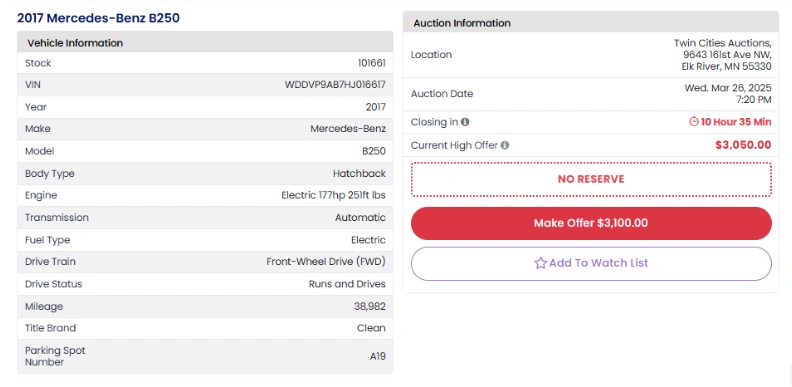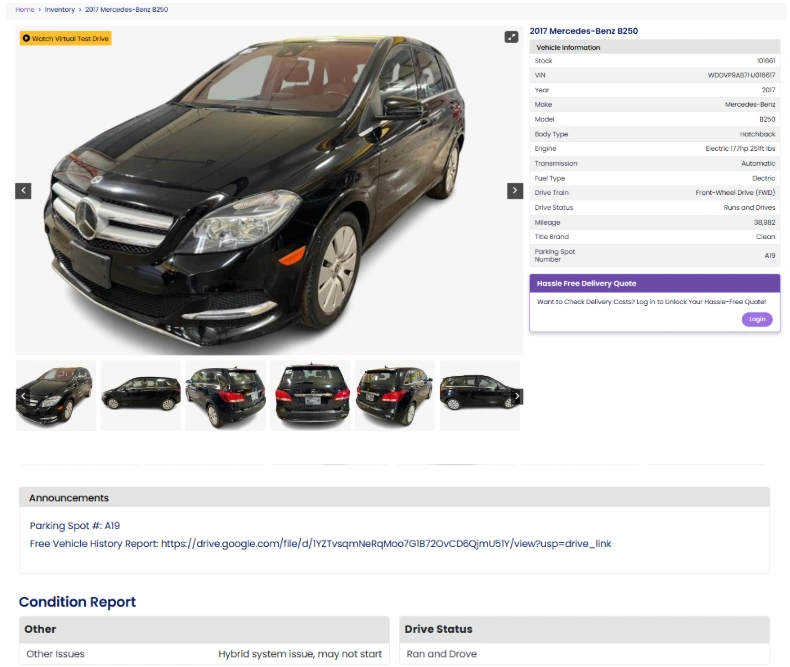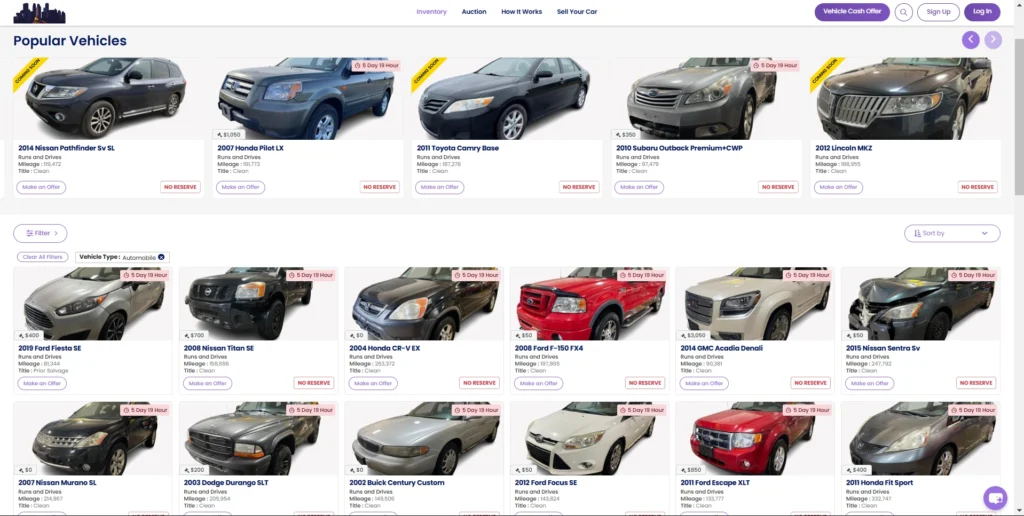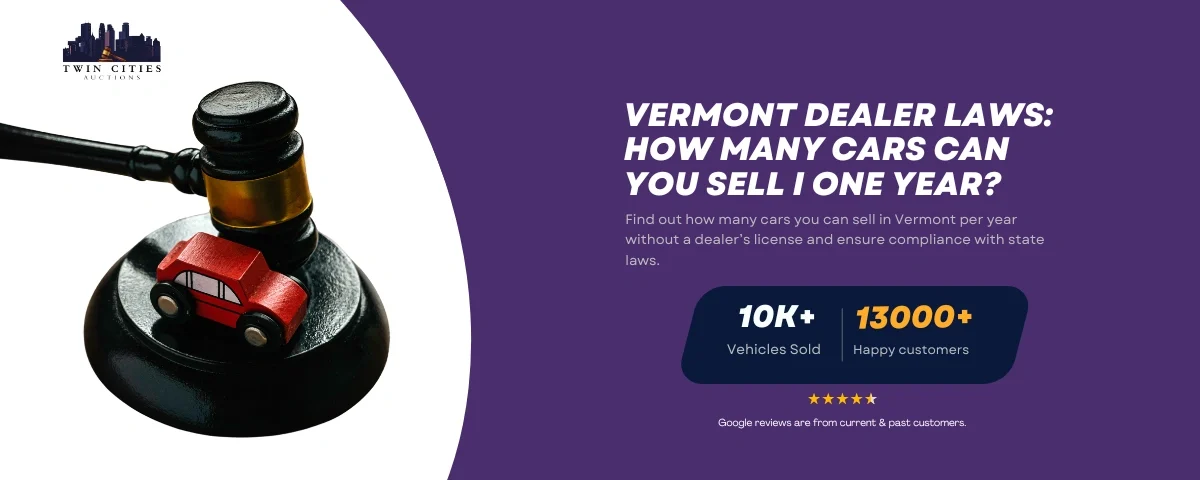Are you considering entering the car sales business in Vermont? One of the first things you need to know is how many cars you can legally sell in a year before you’re required to obtain a dealer’s license.
Understanding Vermont’s dealer laws is essential to ensure that you operate within the state’s legal boundaries.
In this blog post, we’ll break down the key aspects of Vermont’s dealer laws, the licensing process, and provide tips on how to maximize your car sales.

Key Takeaways
- In Vermont, you must obtain a dealer’s license if you sell 12 or more vehicles in a year, whether new or used.
- A dealership must be open for business for at least 146 days per calendar year.
- Dealers must have a physical location with a building of at least 1,200 square feet.
- You can sell up to 11 cars in a year without a dealer’s license if you are not engaged in the business of selling cars on a regular basis.
- Auctions, like Twin Cities Auctions, provide an efficient and transparent option for selling vehicles.
Understanding Vermont Dealer Laws
Vermont has specific laws that govern vehicle sales, designed to protect consumers and ensure fairness in transactions. Whether you are a private seller or a licensed dealer, it’s crucial to understand these laws to avoid penalties.
How Many Cars Can You Sell in Vermont Without a Dealer’s License?
In Vermont, you do not need a dealer’s license if you sell fewer than 12 vehicles in a year. However, if you sell 12 or more vehicles in a year, you are required by the Vermont Department of Motor Vehicles (DMV) to obtain a dealer’s license. This rule applies whether the vehicles are new or used.
Additionally, Vermont considers you to be “engaged in the business” of selling cars if you sell 12 or more vehicles in the preceding year, or if you lease or rent vehicles. Selling vehicles for scrap, dismantling, or destruction is excluded from this requirement.
This threshold ensures that small-scale or occasional sellers are not burdened with licensing requirements while protecting consumers by requiring dealers to meet specific standards when selling vehicles regularly.
Dealer Licensing Requirements in Vermont
If you intend to sell 12 or more vehicles in a year, you will need to obtain a dealer’s license. Vermont has several requirements and regulations in place to ensure that car dealerships operate legally and transparently.
Physical Location Requirement
To qualify for a dealer’s license, you must have a physical location that meets the following criteria:
- The dealership must be open for at least 146 days per calendar year.
- You must either own or lease real estate for your dealership, with the building being at least 1,200 square feet. The building should primarily be used for the dealership’s business operations.
Types of Dealer Licenses
Vermont offers various types of dealer licenses depending on the nature of your sales:
- New Car Dealer License: For businesses selling new vehicles under a manufacturer’s franchise agreement.
- Used Car Dealer License: For businesses that deal primarily in pre-owned vehicles.
- Wholesale Dealer License: For businesses that sell vehicles to other licensed dealers.
Application Process
To apply for a dealer’s license, you will need to:
- Complete the Application: Application forms are available through the Vermont DMV website here.
- Submit Fingerprints: As part of the background check, you will need to submit fingerprints for criminal history screening.
- Proof of Physical Location: Provide documentation confirming your business location, including details about the real estate or lease agreement.
- Pre-Licensing Course: Complete the state-approved pre-licensing course that covers dealership laws and regulations.
- Obtain Insurance: Show proof of insurance to cover your dealership operations.
- Pay Fees: Submit the required licensing fees, which vary depending on the type of dealer license you are applying for.
Dealer Licensing Requirements in Vermont
| Requirement | Details |
| Location | Must be open for 146+ days per year, with a building of at least 1,200 sq. feet. |
| Vehicle Sales | Must sell at least 12 vehicles per year, or have vehicles in lease or rental services. |
| Pre-Licensing Course | Complete a state-approved course on dealership operations. |
| Insurance | Proof of liability insurance for dealership operations. |
| Application Fees | Varies depending on the type of dealer license. |
Market Insights on Vermont Car Sales
Vermont has a smaller, yet active, car sales market compared to larger states. Despite its smaller population, the demand for vehicles in the state is influenced by seasonal trends and economic conditions. Below are some key insights into Vermont’s vehicle sales market:
- Seasonal Demand: With Vermont’s harsh winters, vehicles that can handle snow, such as trucks and SUVs, tend to see higher demand during the colder months.
- Local Economy: Vermont’s economy, which is driven by industries such as agriculture and tourism, has a direct impact on the types of vehicles in demand. Consumers tend to favor fuel-efficient vehicles in warmer months, and larger vehicles like trucks are popular in the winter.
- Population Size: Smaller population compared to other states, impacting the volume of car sales.
- High Demand for Used Vehicles: With the cost of new vehicles rising, more buyers are turning to used cars for affordability and cost efficiency.
Key Factors Affecting Vermont Car Sales
| Factor | Impact on Car Sales |
| Seasonal Demand | Higher demand for vehicles that can handle snow and icy conditions, such as trucks and SUVs. |
| Local Economy | Vermont’s economy affects spending on vehicles, with fluctuations based on agricultural and tourism needs. |
| Population Size | Smaller population compared to other states, impacting the volume of car sales. |
| Used Vehicle Demand | The affordability of used vehicles makes them highly sought after. |
Why Auctions Are a Smart Choice for Vehicle Sales
Selling cars through auctions is an excellent way to quickly move inventory and reach a wide audience. Auctions like Twin Cities Auctions offer a reliable platform for buying and selling vehicles in Vermont and beyond.
Advantages of Using Twin Cities Auctions
- Competitive Pricing: Auctions like Twin Cities Auctions allow sellers to set a competitive price and reach a broad pool of buyers.

- Transparency: Every vehicle listed at the auction comes with detailed information, making the buying process transparent for both parties.

- Wide Inventory: Auctions have a large variety of vehicles available

- Quick Turnaround: Auctions offer fast and efficient sales, helping sellers move inventory quickly.
Why Choose Twin Cities Auctions
| Feature | Twin Cities Auctions | Traditional Dealership Sales |
| Pricing | Competitive auction pricing | Fixed pricing, often higher |
| Inventory | Wide variety of vehicles | Limited to dealership stock |
| Transparency | Detailed vehicle history and condition reports | Varies by dealership |
| Convenience | Fast and efficient vehicle transactions | Longer sales cycles |
| Reach | Attracts a broad national and local buyer base | Limited to local buyers |
Practical Tips for Sellers and Dealers
When selling vehicles in Vermont, there are a few important things to keep in mind to stay compliant with the state’s dealer laws and maximize sales opportunities.
- Track Your Sales: Keep accurate records of each sale, including the vehicle’s VIN, sale price, and buyer information.
- Know the Limits: Be aware of the limit for selling cars in Vermont. If you plan to sell more than four cars in a year, apply for a dealer’s license.
- Consider Using Auctions: Auctions provide an opportunity to spot a great deal which can be useful for sellers looking to buy vehicles to resell in Vermont.
- Stay Informed: Keep up with market trends and adjust your inventory based on what types of cars are in demand.
Ready to Buy or Sell Your Car? No Dealer License Needed!
At Twin Cities Auctions, we simplify the process of buying and selling vehicles, making it straightforward and hassle-free. You don’t need a dealer license to participate—our online platform is open to the public, accommodating both first-time buyers and seasoned sellers.
Whether you’re upgrading your ride or selling your current vehicle, we provide the platform you need that offers a diverse range of vehicles and a transparent bidding process. Start your auction journey with us today!
Looking for more options? Explore our comprehensive list of all available car auctions across the United States. Your next deal might be just a click away!
FAQs
How many cars can I sell in Vermont without a dealer’s license?
In Vermont, you can sell up to five vehicles per year without needing a dealer’s license. If you plan to sell 12 or more vehicles in a year, you must obtain a dealer’s license.
What are the requirements for obtaining a dealer’s license in Vermont?
To obtain a dealer’s license, you must submit an application, provide proof of location, complete a pre-licensing course, submit fingerprints for a background check, obtain insurance, and pay the required fees.
How do I know if I need a dealer’s license in Vermont?
If you sell 12 or more vehicles in a year, you are considered “engaged in the business” of selling cars and will need to obtain a dealer’s license in Vermont.
What types of dealer licenses are available in Vermont?
Vermont offers new car dealer, used car dealer, and wholesale dealer licenses, depending on your business type and sales focus.
Can I sell cars through an auction in Vermont?
Yes, selling cars at an auction is a great option in Vermont. Auctions like Twin Cities Auctions offer a fast and competitive platform for selling vehicles to a large audience.
How do I apply for a dealer’s license in Vermont?
You can apply for a dealer’s license by completing the application forms available from the Vermont DMV, submitting the required documentation, and paying the licensing fees. Forms are available here.
What is the physical location requirement for a dealer’s license?
To qualify for a dealer’s license in Vermont, your business must have a physical location with a building of at least 1,200 square feet that is open for at least 146 days per calendar year.
Are there any fines for selling cars without a dealer’s license?
Yes, if you sell more than five cars without the proper dealer’s license in Vermont, you may face fines or other legal penalties.


